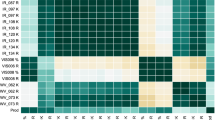Abstract
Accurate solar resource information is a fundamental requirement for solar energy ventures. The lack of precision in solar radiation data can significantly affect the success of the projects. Argentina has solar radiation ground measurement networks. The information obtained through this method is limited due to its spatial sparsity, since it is only possible to measure with appropriate quality in some sites across the territory. To overcome this limitation, it is common to generate models capable of estimating solar radiation through satellite images, which provide spatial resolution. This work develops and validates an empirical model for this purpose based on Machine Learning (ML), demonstrating that it is a useful and accurate tool to be considered. This allows ventures that make use of this type of energy to have greater certainty in the availability of the resource, and therefore in the decision-making process. Variables obtained from images of the geostationary meteorological satellite GOES-16, McClear clear-sky model estimates, and geometrically calculated information are used as input to the algorithms. The results of the ML models are compared with estimates from pre-existing models for the region that incorporate physical modelings, such as Heliosat-4 and CIM-ESRA. The evaluation shows a higher performance of the ML methods when multi-scale satellite information is used as input. The incorporation of multi-scale satellite data is not yet implemented in solar radiation physical modeling, which is an advantage of ML modeling.
Access this chapter
Tax calculation will be finalised at checkout
Purchases are for personal use only
Similar content being viewed by others
References
Abal, G., Aicardi, D., Alonso-Suárez, R., Laguarda, A.: Performance of empirical models for diffuse fraction in Uruguay. Sol. Energy 141, 166–181 (2017)
Aristegui, R., Iturbide, P., Stern, V., Lell, J., Righini, R.: Variabilidad de corto plazo y valores extremos de la irradiancia solar en la Pampa Húmeda Argentina. Avances en Energías Renovables y Medio Ambiente (AVERMA) 23, 19–30 (2019)
Cano, D., Monget, J., Albuisson, M., Guillard, H., Regas, N., Wald, L.: A method for the determination of global solar radiation from meteorological satellite data. Sol. Energy 37, 31–39 (1986)
Emde, C., et al.: The Libradtran software package for radiative transfer calculations (version 2.0.1). Geosci. Model Dev. 9, 1647–1672 (2016)
Huang, G., et al.: Estimating surface solar irradiance from satellites: past, present, and future perspectives. Remote Sens. Environ. 233, 111371 (2019). https://doi.org/10.1016/j.rse.2019.111371
Jiménez, V.A., Will, A., Rodríguez, S.: Estimación de radiación solar horaria utilizando modelos empíricos y redes neuronales artificiales. Cienc. Tecn. 17, 29–45 (2017)
Kriebel, K., Gesell, G., Kastner, M., Mannstein, H.: The cloud analysis tool APOLLO: Improvements and validations. Int. J. Remote Sens. 24(12), 2389–2408 (2003)
Laguarda, A., et al.: Validación de modelos satelitales Heliosat-4 y CIM-ESRA para la estimación de irradiancia solar en la Pampa Húmeda. Energías Renovables y Medio Ambiente 48, 1–9 (2021)
Laguarda, A., Giacosa, G., Alonso-Suárez, R., Abal, G.: Performance of the site-adapted CAMS database and locally adjusted cloud index models for estimating global solar horizontal irradiation over the Pampa Húmeda region. Sol. Energy 199, 295–307 (2020)
Laguarda, A., Abal, G.: Clear-sky broadband irradiance: first model assessment in Uruguay. In: Proceedings of the ISES Solar World Congress, pp. 1360–1371, ISBN:978-39-81465-97-6. https://doi.org/10.18086/swc.2017.21.05
Lefevre, M., et al.: McClear: a new model estimating downwelling solar radiation at ground level in clear-sky conditions. Atmos. Meas. Techn. 6(9), 2403–2418 (2013)
Linke, F.: Transmissions-koeffizient und trübungsfaktor. Meteorol. Mag. Beiträge Zur Physik der Atmosphäre Beitr 10, 91–103 (1922)
Long, C.N., Shi, Y.: An automated quality assessment and control algorithm for surface radiation measurements. Open Atmos. Sci. J. 2(1) (2008)
McArthur, L.: Baseline Surface Radiation Network (BSRN) Operations Manual. Td-no. 1274, wrcp/wmo, World Meteorological Organization (WMO, www.wmo.org)
Olivera, L., Atia, J., Amet, L., Osio, J., Morales, M., Cappelletti, M.: Uso de redes neuronales artificiales para la estimación de la radiación solar horaria bajo diferentes condiciones de cielo. Avances en Energías Renovables y Medio Ambiente-AVERMA 24, 232–243 (2020)
Perez, R., et al.: A new operational model for satellite-derived irradiances: description and validation. Sol. Energy 73, 307–317 (2002)
Perez, R., Ineichen, P., Seals, R., Zelenka, A.: Making full use of the clearness index for parameterizing hourly insolation conditions. Sol. Energy 45(2), 111–114 (1990)
Perez, R., Schlemmer, J., Hemker, K., Kivalov, S., Kankiewicz, A., Gueymard, C.: Satellite-to-irradiance modeling - a new version of the SUNY model. In: 42nd Photovoltaic Specialist Conference (PVSC), pp. 1–7 (2015)
Qu, Z., et al.: Fast radiative transfer parameterisation for assessing the surface solar irradiance: The Heliosat-4 method. Meteorol. Z. 26(1), 33–57 (2017)
Raichijk, C.: Estimación de la irradiación solar global en Argentina mediante el uso de redes neuronales. Energías Renovables y Medio Ambiente 22, 1–6 (2008). (ISSN:0328-932X)
Rigollier, C., Lefevre, M., Wald, L.: The method Heliosat-2 for deriving shortwave solar radiation from satellite images. Sol. Energy 77(2), 159–169 (2004)
Sayago, S., Bocco, M., Ovando, G., Willington, E. A.: Radiación solar horaria: modelos de estimación a partir de variables meteorológicas básicas. Avances en Energías Renovables y Medio Ambiente 15 (2011)
Verbois, H., Saint-Drenan, Y.-M., Becquet, V., Gschwind, B., Blanc, P.: Retrieval of surface solar irradiance from satellite using machine learning: pitfalls and perspectives, EGUsphere [preprint], https://doi.org/10.5194/egusphere-2023-243
Yang, D.: Choice of clear-sky model in solar forecasting. J. Renew. Sustain. Energy 12, 026101 (2020). https://doi.org/10.1063/5.0003495
Author information
Authors and Affiliations
Corresponding author
Editor information
Editors and Affiliations
Rights and permissions
Copyright information
© 2023 The Author(s), under exclusive license to Springer Nature Switzerland AG
About this paper
Cite this paper
Iturbide, P., Alonso-Suarez, R., Ronchetti, F. (2023). An Analysis of Satellite-Based Machine Learning Models to Estimate Global Solar Irradiance at a Horizontal Plane. In: Naiouf, M., Rucci, E., Chichizola, F., De Giusti, L. (eds) Cloud Computing, Big Data & Emerging Topics. JCC-BD&ET 2023. Communications in Computer and Information Science, vol 1828. Springer, Cham. https://doi.org/10.1007/978-3-031-40942-4_9
Download citation
DOI: https://doi.org/10.1007/978-3-031-40942-4_9
Published:
Publisher Name: Springer, Cham
Print ISBN: 978-3-031-40941-7
Online ISBN: 978-3-031-40942-4
eBook Packages: Computer ScienceComputer Science (R0)




